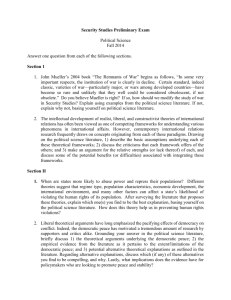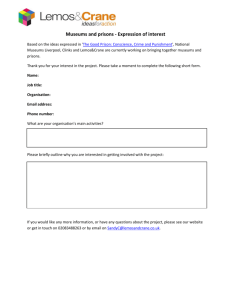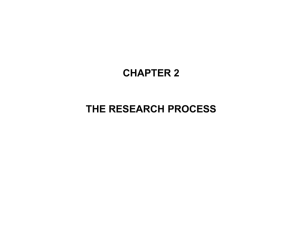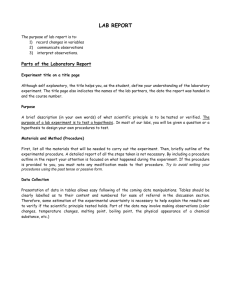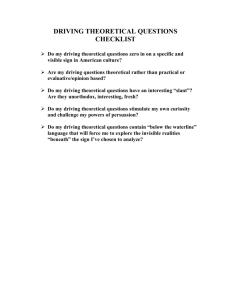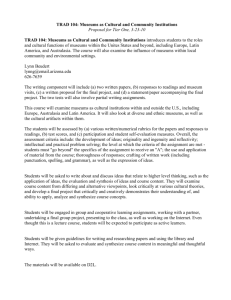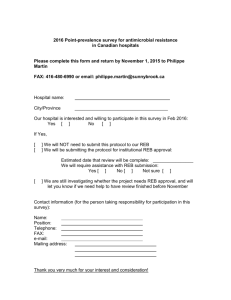Measuring Results - Place-Based Education Evaluation Collaborative
advertisement
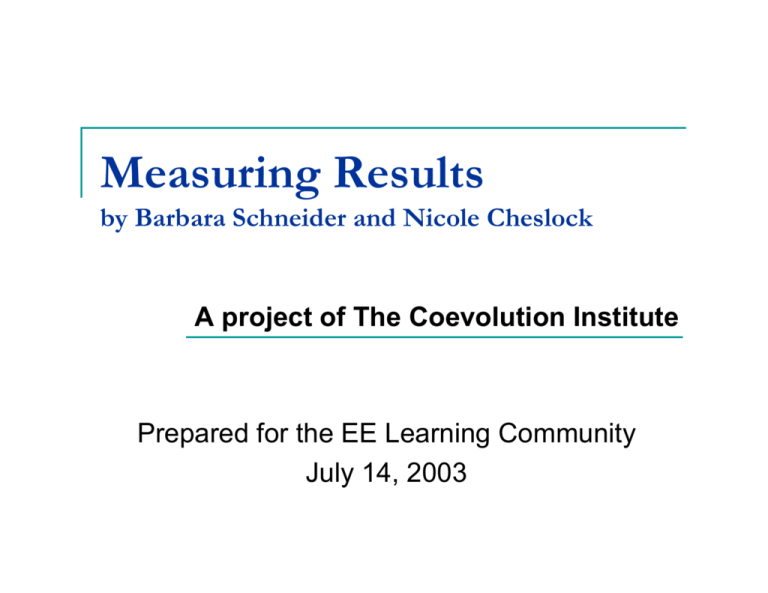
Measuring Results by Barbara Schneider and Nicole Cheslock A project of The Coevolution Institute Prepared for the EE Learning Community July 14, 2003 Purpose of Measuring Results To gain insights into how to best affect and measure behavior change through a cross field analysis of current evaluation practice To provide program stakeholders with information on how different fields have approached the challenge of affecting and assessing behavior change Methods behind Measuring Results Cross field study Health Social Marketing Museums Environmental Education Academic literature review Peer review Health - Overview Strong theoretical base Evaluation dominated by experiments and field studies Successful programs are tailored to the participants and use multiple strategies Successful programs target and teach specific behaviors Health - Theoretical Frameworks Health Belief Model Social Learning Theory CDC Evaluation Framework Health - Methods Case studies Experiment and quasi-experimental designs Listening techniques Tracking Health - Findings Individual characteristics impact intervention outcomes Same sex and similar role models are salient (SLT, research on edu-tainment) Behavioral skills training is effective Multiple strategies have positive results Health - Implications EE Learning Community Implications Tailor to your audience Use multiple techniques Teach skills: Build awareness, knowledge, and experience in targeted behaviors Health - Resources Online Resources Centers for Disease Control and Prevention http://www.cdc.gov/eval/ EC/UNFPA Initiative for Reproductive Health in Asia http://www.asia-initiative.org/m_and_e_2002.html Social Marketing - Overview Social marketing aim to benefit society at large Behavior modification theories and cost benefit models shape social marketing work Evaluation methods include case studies, authentic assessments, SROI Effectiveness based on opinion leaders, credible message providers, support/technical assistance, communication Social Marketing - Theoretical Frameworks Antecedents, Moderators, Consequences Cost Benefit Analysis Social Marketing - Methods Case studies Media and Authentic assessments Social Return On Investment (SROI) Social Marketing - Findings Opinion leader Multiple credible sources Intensive personal support Means of communication - Spreading the message(s) Social Marketing - Implications EE Learning Community Implications Strong leadership/modeling Clear and credible communication Ongoing support/communication of message(s) Building evaluation/assessment components into programming Social Marketing - Resources Online Resources Agency for Healthcare Research and Quality http://www.ahcpr.gov/chip/content/outreach_enrollm ent/outreach7.htm Roberts Enterprise Development Fund http://www.redf.org/ Weinreich Communications http://www.social-marketing.com/ Museums - Overview Theoretical move toward contextual models of learning Observation / time and tracking studies Move toward accounting for visitor variables Learning does take place! Each individual / group has a unique experience within the same setting Museums - Theoretical Frameworks Much of what is known about museum experiences has been influenced by a view of learning that is determined by the degree to which the intended curriculum is understood. This view of learning has expanded to include sociocultural models. Contextual Model of Learning (Falk and Dierking, 2000) Conversational Elaboration (Leinhardt & Crowley, 1998) Museums - Methods Observation Listening Experimental designs Longitudinal Challenges: Duration/frequency of visit(s), determining causal links, likelihood that future experience will trigger full impact of experience, access to visitors Museum - Findings Visitor & exhibit characteristics Family behavior Each visitor has a unique experience Demographic characteristics: years of education Interactive exhibits builds intrinsic motivation, promotes learning Predictable: fairly equal amounts of time at each exhibit, distinct phases including orientation, viewing, cruising, departure Children interact more frequently with hands-on exhibits Field Trips Most effective when there is preparation/novelty reduction Are educational/professional development experiences for classroom teachers Museums - Implications EE Learning Community Implications Each person and group has a unique learning experience Agenda and expectations shape learning experiences Orientation to setting, clear learning objectives, and follow-up have been influential in fostering learning experience for youth Museums - Resources Online Resources Association of Science Technology Centers http://www.astc.org/resource/index.htm Museum Learning Collaborative http://museumlearning.com Environmental Education Overview Move from “Knowledge-Attitude-Behavior” (KAB) model to more complex frameworks Traditional emphasis on quantitative data collection tools moving toward use of mixed methods designs Weak link between theory and practice Multiple factors lead to responsible environmental actions QuickTime™ and a Photo - JPEG decompressor are needed to see this picture. Environmental Education Theoretical Frameworks Knowledge Attitude Behavior Knowledge (or understanding of environmental issues as a result of becoming educated about them) leads to greater awareness (and to a change in attitude), which leads to more responsible behavior with respect to the environment. The empirical links between knowledge, attitudes, and behavior are tenuous: Some researchers believe there is a strong correlation; others suggest weak connections. Environmental Education Theoretical Frameworks Move from “K-A-B” model to more complex frameworks Reasoned Action and Planned Behavior (Ajzen & Fishbein, 1986) Emphasizes intention Activator–Behavior–Consequence (Geller, 1992) Emphasizes activators Responsible Environmental Behavior (Hines et al 1986) Emphasizes affective/personality, cognitive, and situational characteristics Environmental Education - Methods Evaluation Methods Self-reported information (through interviews, questionnaires, surveys) Observation, consumption habits, and authentic assessments Multiple methods Inconsistencies and weaknesses are pervasive Environmental Education - Findings There are many studies that indicate the importance of individual variables but on the whole there is no systematic process across the studies to make definitive statements about the variables. It is clear, though, that individual characteristics are important and play a role in people’s experiences and in how they learn. Environmental Education - Findings Findings - What shapes and impacts responsible environmental behavior (REB)? Environmental sensitivity Locus of control / self-efficacy Knowledge of behaviors Skill in behavior Prompts Demographic factors: gender and years of formal education (Chawla, DeYoung 1996, Hines et al., 1986/87; Hwang et al., 2000; Marcinkowski,1998) Environmental Education-Implications EE Learning Community Implication(s) Fostering REB includes targeting specific behaviors. Fostering REB includes teaching those behaviors in a context that is appropriate to your audience. Tailor! Fostering REB includes building audience’s self efficacy. Environmental Education - Resources Online Resources Interpreting Biodiversity: A manual for environmental educators in the tropics. (Domroese & Sterling. 1999) http://research.amnh.org/biodiversity/center/publ/pubdwnld.html Nature Conservancy Handbook, Framework for Site Conservation http://www.consci.org/scp/download_the_handbook.htm North American Association for Environmental Education http://www.naaee.org/ City of Toronto Assessment & Policy Development Office Individual ecological footprint http://www.city.toronto.on.ca/eia/index.htm Key Findings and Implications of Measuring Results Effective Strategies for Changing Behavior Theories of Change Target Specific Behaviors Tailor Strategies Promote Self Efficacy Key Findings and Implications of Measuring Results Effective Evaluation Strategies Create Measurable Objectives Use Multiple Methods Design and Authentic Assessments Systemize and Disseminate For more information about The Coevolution Institute, the Measuring Results report, and upcoming Measuring Results Symposia, Please contact info@coevolution.org or call 415-362-1137
